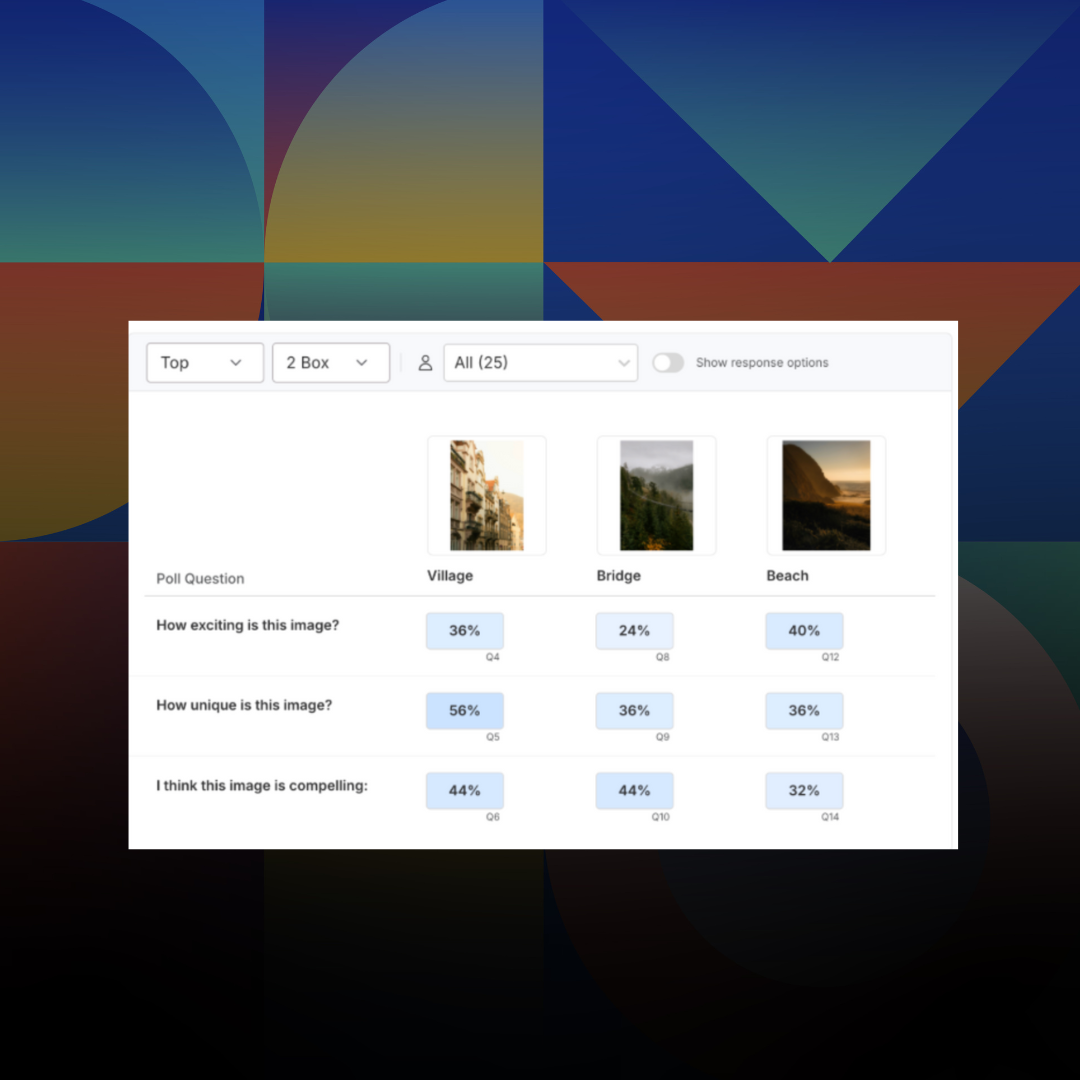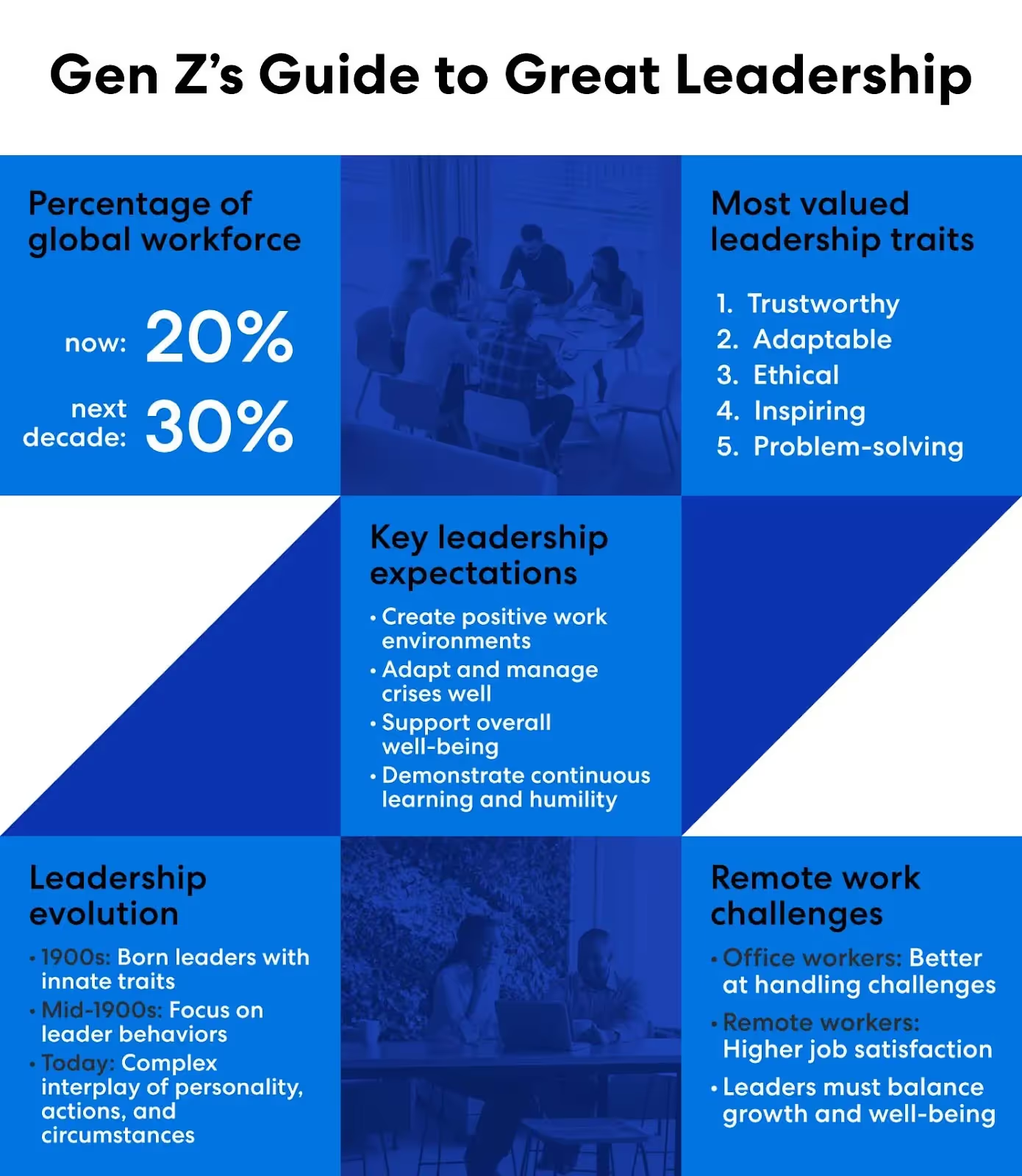.jpg)
Advanced Research
9 Essential Questions for Evaluating Employee Satisfaction Software
February 20, 2026
Employee Research
Articles
.jpg)
Advanced Research
9 Essential Questions for Evaluating Employee Satisfaction Software
February 20, 2026
Employee Research
Articles

Advanced Research
How to Evaluate Market Research Vendors for Global Reach
Team Remesh
February 10, 2026
Market Research
Articles

Advanced Research
How to Evaluate Market Research Vendors for Global Reach
Team Remesh
February 10, 2026
Market Research
Articles

Advanced Research
3 Early-Stage Research Methods to Gather Consumer Insights
Team Remesh
January 27, 2026
Market Research
Articles

Advanced Research
3 Early-Stage Research Methods to Gather Consumer Insights
Team Remesh
January 27, 2026
Market Research
Articles
.avif)
Advanced Research
Why Agencies Should Embrace AI Tools for Market Research
Team Remesh
January 26, 2026
Articles
.avif)
Advanced Research
Why Agencies Should Embrace AI Tools for Market Research
Team Remesh
January 26, 2026
Articles

Advanced Research
The Top Market Research Companies for the CPG Industry
Team Remesh
January 20, 2026
Market Research
Articles

Advanced Research
The Top Market Research Companies for the CPG Industry
Team Remesh
January 20, 2026
Market Research
Articles

Advanced Research
The Most Cutting-Edge Consumer Insights Software of 2026
Team Remesh
January 5, 2026
Market Research
Articles

Advanced Research
The Most Cutting-Edge Consumer Insights Software of 2026
Team Remesh
January 5, 2026
Market Research
Articles

Research 101
Introducing: Poll Comparison - Streamline Concept Testing and Make Better Decisions Faster
Emmet Hennessy
November 24, 2025
Market Research
Articles

Research 101
Introducing: Poll Comparison - Streamline Concept Testing and Make Better Decisions Faster
Emmet Hennessy
November 24, 2025
Market Research
Articles

AI
Purpose-Built for Research AI is Here - a Letter from the CPO
Jessica Dubin
October 21, 2025
Market Research
Articles

AI
Purpose-Built for Research AI is Here - a Letter from the CPO
Jessica Dubin
October 21, 2025
Market Research
Articles

Advanced Research
Unlock Agile Global Insights: Using Remesh Multi-Language Conversations for Research Across Audiences
Customer Success Team
October 14, 2025
Market Research
Articles

Advanced Research
Unlock Agile Global Insights: Using Remesh Multi-Language Conversations for Research Across Audiences
Customer Success Team
October 14, 2025
Market Research
Articles
How Gen Z Leadership Expectations Are Shaking Up the C-Suite
Learn how Gen Z's unexpected demands for leadership are transforming the workplace—and see why companies that adapt are winning the talent war.



Forget the old image of a leader with a booming voice and commanding presence. For Gen Z, leadership looks quite different. This digital-native generation is reshaping what it means to lead as they enter the workforce. I was a part of the research team behind Seton Hall University's Future of Leadership Study which interviewed Gen-Z about what it means to be a leader. This study reveals that Gen Z values leaders who are trustworthy, adaptable, and ethical over those with traditionally prized traits like an authoritative demeanor.
Gen Z, now making up about 20% of the global workforce and expected to reach 30% in the next decade, brings fresh perspectives to the workplace. They've grown up in a world of rapid technological change and global challenges. As a result, their expectations for leaders are changing traditional notions of effective leadership.
How leadership has evolved
Leadership theories have changed a lot since the early 1900s. Back then, people thought leaders were born, not made. They believed only special individuals with certain innate traits could lead.
By the mid-1900s, researchers started looking at how leaders behave instead of only focusing on their traits. Researchers found that good leaders do two main things. They set clear goals and they care about their employees. However, this perspective overlooked the impact of different situations on leadership effectiveness.
Now, we understand that leadership is complex. It depends on the leader's personality, actions, and their circumstances. Modern leadership theories consider all these factors, shaping Gen Z's evolving expectations of leadership today.
Gen Z leadership expectations
The study shows that Gen Z looks for different qualities in leaders compared to older generations. They care more about a leader's values and how they handle change. In contrast, physical traits or natural abilities are less important to them.
Trust and ethics matter most
Gen Z values leaders who are trustworthy and ethical. They want leaders who inspire and help them grow, not just bosses who give orders. For them, good leaders create a positive work environment, solve problems creatively, and genuinely care about their employees' well-being.
This focus on trust reflects bigger trends in society. With significant change occurring in the world, Gen Z wants leaders who provide stability. They also want leaders who give their work meaning. These desires are central to Gen Z leadership ideals.
Dealing with change and crises
Gen Z also wants leaders who can adapt to change and handle crises well. They've grown up with fast tech changes, political shifts, and global issues like climate change and the COVID-19 pandemic. Because of this, they value leaders who can guide teams through tough times.
Additionally, Gen Z seeks leaders who respond positively to setbacks and view failures as learning opportunities. They prioritize work-life balance and expect leaders to provide job security while encouraging workplace flexibility. These qualities are essential as businesses navigate increasingly complex and unpredictable situations. Ultimately, adaptability is a core component of Gen Z's leadership expectations.

Caring about overall well-being
Gen Z expects leaders to care about more than just work performance. They want employers to support their overall well-being, including their mental and physical health. Many view their job as a key part of their identity and personal growth, seeing it as more than just a way to earn money. This holistic perspective is shaping Gen Z's leadership preferences.
Looking the part
Gen Z consistently says they want leaders who dress well and maintain good health. This focus on appearance is interesting because, unlike past generations, they emphasize aspects that people can control. Things like an authoritative voice don't matter as much. This preference might reflect how important self-care is to Gen Z. It might also reflect how much they care about personal image.
Always learning and staying humble
Gen Z values leaders who are always learning and can admit when they make mistakes. This is important because things change quickly, and people often need new skills to stay relevant. Leaders who recognize their limits and learn from their errors are more likely to connect with Gen Z employees. This focus on continuous learning is a key part of what Gen Z expects from their leaders.
How technology has affected Gen Z leadership expectations
The study also examined how digital technology influences Gen Z's expectations of leaders, particularly in relation to remote work.
It turns out most employees, including Gen Z, still work in offices rather than remotely. This contradicts popular beliefs about how widespread remote work is. While remote work is often viewed as the "better" option, office-based employees report either no change or positive effects on their professional growth compared to remote workers. Office workers also indicate they can handle complex challenges more effectively than their remote counterparts.
However, remote workers report higher job satisfaction. This presents a challenge for leaders. After all, Gen Z expects leaders to support their happiness and well-being while also supporting their professional growth. Balancing these needs is a crucial aspect of meeting Gen Z's leadership expectations.
The findings highlight the importance of understanding what each employee wants from their work. Research by Amy Wrzesniewski, a scholar at Yale, suggests that people relate to work in three different ways. Some see their job as just that – a job. They work to earn money and their passion lies elsewhere. Others view it as a career, something they want to excel in and advance. The third group sees their work as a calling – something they're deeply passionate about.
These different perspectives are reflected in Gen Z's preferences. Some may view their job simply as a way to earn money and prefer remote work so they can focus on other interests. In contrast, others may see work as a key part of their identity and may benefit more from being in the office. Understanding these different perspectives is crucial for leaders aiming to meet Gen Z's expectations.
Good leaders will need to create flexible work arrangements that accommodate different styles while still promoting growth and collaboration. This flexibility is essential for effectively meeting Gen Z leadership expectations.
Using Remesh for Employee Listening
As organizations aim to meet Gen Z's leadership expectations, they need powerful tools for employee listening. Remesh, an AI-powered insights platform, offers a solution that fits well with Gen Z's love for open communication and technology. Remesh allows companies to have live, interactive talks with large groups of employees all at once.
One of Remesh's key features is its promise of anonymity. When employees know their responses are anonymous, they feel safer sharing honest thoughts. This helps build the trust that Gen Z values so much in leadership. The platform can engage thousands of workers at the same time, which means companies can hear from a wide range of voices across their workforce.
Remesh doesn't just collect responses; it makes sense of them too. The platform uses AI to analyze answers in real-time, spotting important themes and feelings. This helps leaders quickly understand what their employees are saying and take action based on that feedback. Companies can use Remesh for different purposes, from quick pulse checks to deep dives on specific topics. This flexibility allows leaders to stay in tune with their employees' changing needs and expectations.
By using tools like Remesh in their employee listening plans, companies can create a leadership culture that's more responsive and adaptive. This approach aligns well with what Gen Z expects from their leaders. It shows that the company values employee input and is willing to act on it, fostering a workplace where all workers feel heard and understood.
Wrapping up Gen Z leadership style
More and more Gen Z employees are entering the workforce. Their unique view of leadership is changing how we develop effective leaders. Gen Z emphasizes trust, ethics, adaptability, and overall well-being. This new perspective on leadership creates opportunities, but it also poses challenges.
Despite challenges, organizations must make an effort to meet Gen Z's leadership expectations. Understanding these expectations can help foster better leadership cultures and strengthen connections with Gen Z employees. This is essential if businesses want to thrive as the Gen Z workforce continues to grow. Implementing an employee listening program, powered by platforms like Remesh, can help organizations stay ahead of the curve.
The way we think about leadership will continue to evolve. Gen Z's perspective is just the latest chapter in this ongoing story. The most successful future leaders will combine timeless principles with new ideas. They will meet the unique needs of this rising generation and embody the ideals of Gen Z leadership.
As we look to the future, one thing is clear: the leader with the booming voice and commanding presence might need to step aside. The leaders of tomorrow will need to be as trustworthy, adaptable, and ethically sound as their Gen Z employees expect. They'll also need to be excellent listeners, leveraging tools like Remesh to stay connected with their workforce's evolving needs and expectations. After all, in the world of Gen Z leadership, it's not about how loud you can shout – it's about how well you can listen, adapt, and inspire.
Co-Authors for this research are Ruchin Kansal and Karen Boroff.
Ruchin Kansal is a Professor of Practice at the Division of Continuing Education and Professional Studies and a Visiting Instructor at the Stillman School of Business, Seton Hall University, where he teaches leadership, management, and innovation. He is also a Visiting Professor of Practice of Leadership at the School of Professional Studies, Brown University.
He is the founder of Kansal & Company and advises companies on digital business, growth strategy, and innovation and solves the most pressing corporate leadership challenges. His recent customers include NRS, Becton Dickinson, the World Bank Group and the United Nations. He is frequently invited to speak on leadership, AI, and innovation.
Prior, Professor Kansal spent 20+ years in the life sciences industry, where his strategy, innovation, and digital business expertise have earned him a stellar reputation for his ability to challenge the status quo, tackle complex challenges, and deliver sustainable outcomes. He served as the Senior Vice President and Global Head of Strategy for Digital Services at Siemens Healthineers, where he launched AI-enabled clinical decision support technology. He established and led the first Business Innovation & Transformation department at Boehringer Ingelheim, where he architected industry-leading strategic partnerships, commercially launched the first smart inhaler, and built AI-based predictive models and clinical decision support systems. Additionally, he has served as a management consultant at Deloitte and Capgemini/Ernst & Young. He has served on multiple Boards, and currently serves on the Board of the NJ Society for Information Management.
He received the 2016 MM&M Top 40 Healthcare Transformers Award and Boehringer Ingelheim’s President’s Award. He was invited to the Obama White House to share best practices for engaging patients in research supporting the Presidential Precision Medicine initiative.
He co-authored Redefining Innovation: Embracing The 80-80 Rule to Ignite Growth in the Biopharmaceutical Industry and contributed a chapter in Digital Strategies and Organizational Transformation. He is In The Lead’s founding editor and the primary investigator of the Future of Leadership Survey. He hosts 30 Minutes, a TV talk show in Connecticut.
Karen Boroff, Ph.D. is a Professor of Management and Dean Emeritus and specializes in Human Resource Management, General Management, Organizational Behavior. You can learn more about her publications and service here.
-
Lorem ipsum dolor sit amet, consectetur adipiscing elit. Suspendisse varius enim in eros elementum tristique. Duis cursus, mi quis viverra ornare, eros dolor interdum nulla, ut commodo diam libero vitae erat. Aenean faucibus nibh et justo cursus id rutrum lorem imperdiet. Nunc ut sem vitae risus tristique posuere.
-
Lorem ipsum dolor sit amet, consectetur adipiscing elit. Suspendisse varius enim in eros elementum tristique. Duis cursus, mi quis viverra ornare, eros dolor interdum nulla, ut commodo diam libero vitae erat. Aenean faucibus nibh et justo cursus id rutrum lorem imperdiet. Nunc ut sem vitae risus tristique posuere.
-
More
.jpg)


Stay up-to date.
Stay ahead of the curve. Get it all. Or get what suits you. Our 101 material is great if you’re used to working with an agency. Are you a seasoned pro? Sign up to receive just our advanced materials.

.png)

.png)

.png)
.png)





